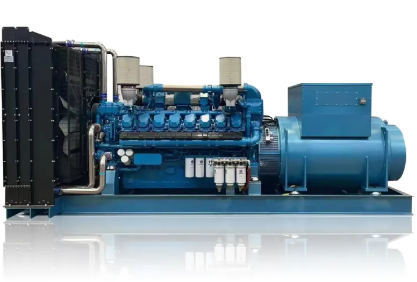Essential Diesel Generator Maintenance Tasks
Regular Oil and Filter Changes
Regular oil changes form an essential part of keeping diesel generators running smoothly and performing at their best. Most mechanics recommend changing the oil somewhere between 150 to 200 operating hours, though always check what the manufacturer actually says in their manual for the most accurate guidance. Don't forget about the oil filter either when doing these changes because if left out, dirt and debris can work its way back into the engine and really mess things up over time. Using good quality oil that matches or even surpasses what the factory specs call for makes all the difference in how long the engine lasts and how efficiently it runs day after day. Stick with regular maintenance on both oil and filters, and the generator will keep chugging along reliably for years instead of breaking down unexpectedly.
Coolant Level and Quality Checks
Monitoring coolant levels and checking its condition matters a lot when it comes to keeping diesel engines from overheating. A quick look now and then makes sure there's enough coolant in the right range so it can actually do its job of cooling things down. Don't forget to check what the coolant looks like too. Rust spots or strange colors might indicate corrosion building up inside, something that can wreck an engine pretty badly if ignored for too long. Most maintenance schedules call for flushing out old coolant and putting fresh stuff in place every so often. Stick to those intervals recommended by whoever made the generator, and the cooling system stays reliable. Engines run better when they stay within their normal temperature range, which means longer service life and better performance overall. Just ask anyone who's dealt with a seized engine because they neglected basic coolant maintenance!
Air Filter Inspections and Replacements
Keeping air filters clean plays a big role in how well a diesel generator works. Most technicians recommend checking them after about 100 hours of running time to catch any blockages before they start affecting performance. When filters get dirty or show signs of damage, replacing them becomes necessary to keep proper airflow going while stopping dust and other debris from getting into the engine components. It's worth noting that not all filters fit every generator model equally well. Using ones specifically made for the particular unit helps engines run better and last longer. Neglecting filter maintenance can lead to reduced power output and increased fuel consumption over time, so staying on top of this routine task makes good sense for anyone relying on their generator regularly.
Fuel System Management for Reliability
Preventing Fuel Contamination
When fuel gets contaminated, it really messes with how reliable and efficient diesel generators actually work. Keeping fuel in clean, dry storage tanks matters a lot since dirty fuel often leads to breakdowns down the road. Good practice involves using proper storage tanks where dirt and moisture just don't have a chance to build up over time. Another smart move for maintaining good fuel quality? Installing fuel polishing systems. These setups basically filter out all those tiny particles and unwanted microbes that slowly ruin the fuel quality. Regular checks on fuel condition through testing make sense too. Catching problems early saves money and headaches later, while keeping generators running at their best when they're needed most.
Fuel Filter Maintenance and Draining
Keeping fuel filters in good condition plays a big role in maintaining how well a diesel generator works and stays dependable. Most technicians follow what the manufacturer says about checking and changing these filters regularly because blocked filters stop fuel from flowing properly through the system. Water buildup in the filters needs attention too since moisture leads to rust forming inside the fuel lines, something that causes serious problems down the road when left unchecked. When someone sticks to routine checks for their fuel system, they get better performance overall while reducing chances of breakdowns caused by dirty or contaminated fuel getting into sensitive parts of the engine.
Cooling, Exhaust, and Electrical System Care
Radiator and Hose Inspections
Checking out the radiator and associated hoses plays a big role in keeping the cooling system running properly on diesel generators. When there are leaks or damage present in these parts, the generator tends to overheat which really messes with its overall performance. The best approach? Get into the habit of looking at those hoses periodically to see if they're still pliable without any visible cracks forming. If something looks off, swap it out right away. Cleaning those radiator fins also matters quite a bit since it helps improve air movement across them, making sure the whole cooling process works better. All these steps matter when it comes to taking care of radiators and their connecting hoses, ultimately helping maintain good health for the entire cooling system throughout the life of the generator.
Detecting and Repairing Exhaust Leaks
When exhaust leaks go unnoticed in diesel generators, they tend to mess up engine performance while letting out dangerous emissions into the air. Checking the exhaust system regularly makes it possible to catch these problems before they get worse. For those hard to spot leaks, a smoke test works wonders most of the time. Just pump some smoke through the system and watch where it escapes. Fixing these leaks quickly matters a lot. On one hand, it keeps the generator running properly. On the other hand, it avoids getting hit with fines from environmental agencies. Regular maintenance like this ensures cleaner operation overall and saves money in the long run by preventing bigger issues down the road.
Battery Testing and Terminal Cleaning
Testing batteries regularly makes sure that diesel generators will actually start up when they're needed most. If a battery is weak or completely dead, the generator simply won't turn on, which leaves people stuck without backup power during blackouts. That's why checking batteries from time to time helps figure out how well they're really working. Cleaning those terminal ends where the cables connect is also important because corrosion builds up there over time and messes with the electricity flow. Most manufacturers recommend replacing batteries according to their own timelines since old ones tend to lose effectiveness gradually. Taking care of these maintenance tasks protects the whole electrical system in the generator, so it keeps running smoothly whenever emergency power becomes necessary.
FAQ Section
How often should I change the oil in my diesel generator?
The oil should be changed every 150-200 hours of operation, following the manufacturer's guidelines for best results.
Why is coolant maintenance important for diesel generators?
Maintaining coolant levels and quality prevents overheating, helping prolong the engine's life and efficiency.
What can lead to fuel contamination in diesel generators?
Fuel contamination often occurs when stored in unclean or damp containers. Using clean, dry containers and fuel polishing systems can help prevent it.
How do I check for exhaust leaks in my generator?
Regular inspections and smoke tests can effectively identify exhaust leaks, ensuring optimal performance and regulation compliance.

